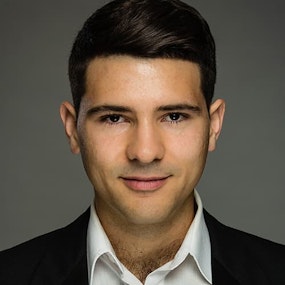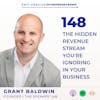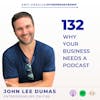How to Time-Block Your Week for Maximum Productivity with Ashao FreeSky

If you’re a business owner struggling to do #allofthethings and still find any kind of healthy work-life balance, you’re not alone. That’s why Ashao FreeSky is here to share the time-blocking productivity tips you actually need PLUS the way to identify the energy and time leaks overwhelming you.
Despite all of the productivity tips you try to follow, how often do you feel like there’s just never going to be enough time in your day to get it all done?
If you’re a business owner, you’re definitely not alone in your struggle to do #allofthethings and still find any kind of healthy work-life balance.
But today’s guest, Ashao FreeSky is here to help and he’s sharing how to time-block your week for maximum productivity… and it’s probably not in the way you expect.
BY THE TIME YOU FINISH LISTENING, YOU’LL LEARN:
- The productivity tips you actually need to stay focused on the high-priority activities that generate leads and sales
- How to identify the energy and time leaks that are causing you to feel overwhelmed and ruining your work-life balance
- What “karoshi” is and how it’s slowly killing you
_____________
Liked this episode? Pay it forward and share it with a friend.
Love the show? Write a 5-star review — even one sentence helps us keep bringing you the content you want to hear.
More from Courtney:
- Website: theeffortlesslife.co
- Instagram: @thecourtneyelmer
Some product links on this site are affiliate links, which means we'll earn a small commission for any affiliate purchases you make (at no additional cost to you). We only recommend products that we use and/or personally trust, so you can browse with confidence.
All Rights Reserved | © The EffortLESS Life®
Courtney Elmer 0:00
You're listening to another episode of the AntiFragile Entrepreneurship™ Podcast. This is episode 116.
[INTRO]
Courtney Elmer
We all hate spinning our wheels all day long, only to feel like we haven't accomplished anything of real value. Today, Ashao FreeSky, the CEO of double your time off, joins me to show you how to become more effective with the time that you have available to build your business. It's not about doing more, it's not about adding more. But it's about learning how to utilize the time you have more effectively for productivity.
Courtney Elmer 3:24
Ashao, Welcome to AntiFragile Entrepreneurship™ Podcast.
Ashao FreeSky 3:28
Thank you so much for having me, Courtney Elmer.
Courtney Elmer 3:31
Right before we hit record, I realized the mutual connections that we have. And I feel like this online business space is such a small world. It's so vast, but so small in so many ways. So it is very cool to meet you. To start us off, what is your specific definition of time management? How would you define that for us? And how would you invite us to think about time and productivity?
Ashao FreeSky 4:30
Yeah, that's a great question Courtney Elmer. There are some pre existing notions in terms of productivity and what time management is. And it leads to some issues that I see rising up. I think what comes to mind about productivity for a lot of people is getting more done faster. And the reason why I say this as an issue is because it leads to this idea idea that we, we get caught in what I call the hamster wheel trap, where we're we have this belief that if I could get more done faster, then I'll be able to relax and slow down. This obsession with hustling, grinding. This is literally killing people. They've coined a term in Japan, karoshi, which is death by overwork. There's always more to do. And so you'd like the hamster that's running faster on the wheel, doo doo doo doo doo, you're going around and around. Doesn't matter how fast you run, you never get to get off.
Courtney Elmer 5:32
I think everyone listening can relate to that feeling. 100%. I mean, I have been there so many times in my business, and even to this day, still find myself that myself there sometimes. And I feel that you hit the nail on the head when you said, our culture supports it. Like our culture actually supports this productivity idea of hustle, they glorify it, and they put it up on a pedestal. And we then become conditioned and develop our own belief systems around what it takes to be successful. Do you find that this is the case?
Ashao FreeSky 6:13
Yeah, yeah, absolutely Courtney Elmer. And I know, I was caught in that for a long time. trying to grind it out working seven days a week. I have two kids, and I was doing what I thought I was supposed to be doing for productivity. And I was, like, the whole kind of reason I got into entrepreneurship in the first place was to create more flexibility in my schedule, and I was missing out on the time with my daughter. And then I find myself working seven days a week, and I'm on this productivity hamster wheel again. And I knew, like something had to change. There's only so many hours in the day. And if I'm, if I'm constantly trying to squeeze more productivity in to those hours, I end up either sacrificing my family or my health, or I think a lot of people end up sacrificing both.
Courtney Elmer 7:05
That was a wake up call, for me was this health crisis at 25 years old, in the form of a cancer diagnosis that I didn't see coming. And this is why I was so excited to bring you on the show today. Because I firmly believe that you don't have to let it go that far before you can start making changes. You shouldn't have to have some kind of rock bottom life altering wake up moment. And unfortunately, for many people, that is the thing that gets them to change and to take action. But for those listening today who are struggling with productivity, because you feel that there isn't enough time in a day, and you can't fit it all in and you are busy all day, but you put your head on the pillow at night and you're like, what did I actually accomplish?
Why do you think it is that we can get up we could go to work, we cram all this stuff in for productivity, we feel busy all day. But yet we still struggle to accomplish what's important, we still struggle to prioritize what we say is a priority for us.
Ashao FreeSky 8:32
So Courtney Elmer, I spoke about the the hamster wheel productivity trap that we get caught in. And the way that I see it the way they escape, this is what I call the laser beam effect. And so if you think of the analogy of the sun, versus the laser beam, so the sun emits billions of kilowatts of energy onto the earth. And,, if you go out into the sun, the worst what's going to happen is maybe get a sunburn. Now compare that to a laser beam, that focus is a few watts, not kilowatts, not billions of kilowatts. And that's enough to cut through diamond. So there's a few elements that piece there.
For laser, you need to have energy, right Courtney Elmer? There needs to be a sufficient amount of energy that you can actually put into something. And then you need to be able to focus that energy for productivity. So that it's effective, right? That's like the sun is energy everywhere all over the place. And I think a lot of entrepreneurs are kind of tend to be like that. They're trying to , they're sold these ideas and okay, I need to go do this thing for the best productivity. And I need to be on all the social media platforms and try this marketing strategy. They shoot in a million directions and, and there's no productivity.
So there's energy, there's focus, and then there's priority. So You need to have energy that is focused, but you need to focus it in the right direction for productivity. When it comes to priority, like that's cutting out all the crap- plugging energy sucks. You don't have proper systems set up, maybe you don't have task or project management, you don't have good communication channels within your team. And so you plug those energy sucks. And then you also need to have sufficient energy. And this is totally overlooked by most people who talk about productivity and time management, it's like, actually getting your physical health and mental and emotional state, to a level where you can perform at your best, and show up as the leader that you're meant to be in your business. And your family. For me, what it really comes down to is not so much time management, as much as it is energy management, priority management, and attention management.
Courtney Elmer 11:00
I love how you reframe to that. Because time is such a finite resource. So his energy, so his attention, but yet, we don't often consider that when we're trying to build optimal productivity from limited resources. And we're trying to grow from limited resources that we will always be limiting ourselves, if we're bumping up against the walls of those limitations within those resources, we're always looking at the calendar and how to organize it better, and how to better manage our time for productivity, and not even considered the other facets of this equation that are at play here, too, that are either working for us or working against us.
Let's dig in there a little bit for a minute, because I love the idea of talking about energy management, figuring out what's draining you they're figuring out how to plug those holes, and same thing with your attention, figuring out what's distracting you, and how to eliminate those distractions for productivity. What practical tips do you have for us to actually do that, because I think there's, there's so much value in learning how to do that. And it can be a struggle to know where to start.
Ashao FreeSky 12:09
Courtney Elmer, I think about energy management, I break it down into three categories. The first and most obvious is physical energy. So that is things like having sufficient sleep, which , it's not sexy. But if you look at the studies, having eight hours of sleep a night is going to drastically improve your performance and productivity, whether or not you think sleep makes a difference for you. So there's sleep movement practices, getting your blood pumping, is a huge cognitive enhancement. The reason like to move is not for your physical body, it actually for conditioning your brain.
And as an entrepreneur, or as a as a parent, your ability to have clear mental faculties and to really be present is invaluable. So that that's the the physical energy component. But then there's also emotional and, and mental energy components. And so when it comes to the mental energy components, Courtney Elmer, a lot of that has to do with like information overload, and not having a way to process that information in a way that you're not constantly thinking about business, you're not constantly thinking about all the different tasks you have, like how, you have 1000 unread emails in your inbox, like having proper information processing systems in place, and then the emotional, spiritual side of energy is having a purpose and having a mission in your business and and in your life that fuels you.
If we're not clear on what we are truly trying to accomplish and what we're here to be creating Courtney Elmer, the business becomes a drain with zero productivity. There's this great quote by Tony Robbins. Any activity that doesn't have a meaningful purpose ascribed to it is work. And so if you have a meaningful purpose to what you're doing doesn't feel like work. It feels like fun and service.
Courtney Elmer 14:24
Absolutely, I can totally agree with that. And that, really truly gets to the heart of what we do here at the EffortLESS Life® because people push back on me on that they're like effortless, you can't really be successful and for it to feel easy. And I'm like I never said that it was easy, but that it can feel effortless and you exactly described that like this feeling of when you are so in flow and so connected to what you were doing, and you're not bogged down by all of these other things that have been distracting and draining you and you're spending your time in your zone of genius that work doesn't feel like work.
Ashao FreeSky
And we've all had glimpses of that Courtney Elmer.
Courtney Elmer
But imagine if you could spend the majority of your time there. What would that do for you? What would that do for your business and your productivity? Like, that's the vision that drives our company. And and I love this conversation, because I get this question a lot. People say, well, Courtney Elmer, what's the difference between working in your business versus working on your business? And working on your business is stopping to think about the very things that we're talking about here today? And figuring out what are these things that really energize you? And what are the things that drain you? Where would you say, we should look for what's really draining us? And how would we go about plugging those holes so that we can then reclaim that time and productivity and put it towards these things to rebuild our energy,
Ashao FreeSky 15:53
Courtney Elmer, a simple indicator is that if you are not looking forward to Monday, that's, that's a sign that your productivity is out of alignment. And that that could point to physical energy, like you're purely exhausted, and you perhaps need to get more sleep and, and perhaps get some more water hydration, also, greatly underlooked drink more water. And so that, it could be that or it could tie into, one of the other ones like emotional energy that perhaps you're not doing what you really know you should be doing, and deep down to something else that is calling you, but maybe you don't believe you can actually make that work. And I know that's been a journey for me is being honest with myself and not fooling myself and thinking like, oh, I can't make that work because of this and that. So it could be it could be a variety of, of those Courtney Elmer.
The number one thing that I see people go wrong Courtney Elmer, is they have a go big or go home mentality. I'll give you a life example and a business example. So in terms of a life example, let's say you want to start moving, and instead of going and I'm going to go hit the gym five days a week, and I'm going to do these one hour workouts. Instead of doing that, what if you told yourself, after every time I go pee, I'm going to do two push ups. Now, it might sound like, well, that's not gonna get me anywhere. But that's not the point. The point isn't to make massive progress right off the bat, the point is to develop a habit, a foundation upon which you can build. And once you have that habit built, then you can, once you have more motivation, it gets easier for you, then you build from there. But if you can't develop that foundational habit of showing up, you have no business trying to create some big change.
If you want to start planning your day ahead of time Courtney Elmer, well, you could jump in and start doing this whole time blocking strategy and going in and planning everything in detail. Or you could start small, so the first option you're going to have mental resistance to that. And you're probably going to give up after a certain amount of time unless you're very motivated for a long period of time. Instead, you could develop the habit. At the end of my day, I'm going to take out a sticky note and write down my one most important thing to accomplish for tomorrow. That's develop that habit. And you'll be amazed Courtney Elmer at how much more motivated you are and how you see productivity and the momentum being built, by staying true to what you said you were going to do.
Courtney Elmer 18:52
Yeah, that last piece, especially because whenever we're forming new habits for productivity, and this is a whole other conversation, we could probably have here a show about habits and how those are formed and how we could really trip ourselves up when we try to make them too complicated and how it's actually at an identity level that needs to shift first and all these things that go into that. But that last piece and how you clarify that and simplify that where it was , it's something that seems so small and maybe insignificant, but because of the positive emotion that it's going to bring about within you when you do that.
And when you see yourself accomplishing that again and again. It's actually going to fuel you it's going to give you that productivity energy to continue. This is why I love habit tracker so much because it's like I could check that little box and I know like okay, I drink my water today, right? It's like such a seemingly small thing. I mean, you mentioned the importance of hydration. Yes, hydration is important. But it's like literally all I did was drink water today. Check the box, but seeing a row of checkboxes for me. I don't know about you, but I get like really excited about that and I kind of geek out about it. I'm like did it I drink my water for a week.
And I think we all can relate on some level where it's like sometimes it seems like the silliest little things. But when we see our progress, we're actually tracking that progress. It's evoking those positive feelings within us. It inspires us to continue because we it's the dopamine rush, like, we want that, again, we want more of that. And it feels fulfilling, and that productivity is satisfying and gratifying. So speaking of planning your day, this is where I would like to go next and talk with you, about time blocking. Because I think, again, when it comes to time management and productivity, it does help to have practical frameworks in place or fundamentals that we can refer to whenever we look at our calendar and say, Okay, how am I going to structure this and I always make this joke, because I'm like, , the easiest way to manage your calendar is to let someone else manage it for you, because they will never overbook, you. But I know not everyone is in that situation.
Some of us like to maintain control of certain things in our business, and the calendar might be one of those things. So for those listening today who feel like they're always overbooked, they're always short on time, they can never get to everything on their to do list in the course of a day. What would you recommend in terms of helping them plan their day ahead of time for productivity How do we begin to start structuring our time?
Ashao FreeSky 21:33
When I think about scheduling my week Courtney Elmer, I like to think about my life categories, because my like, my mission is I want to help people design a business in life that they love. Because I know that if they do that, they're going to model that for their kids. And I want to create a society where it's normal for kids who grew up knowing that they can create a life that they want. So when I think about scheduling my week for productivity, I think about it in terms of my life categories. So the three categories that I like to think about are health and self, family relationships, and service or work. So when I'm looking at planning my week, I like to think of it in terms of like, what is my weekly rhythms and then planning my day.
The key Courtney Elmer is to not get to at all, and to be to learn to be comfortable with having things being left undone. And having the more important things, those things we want to make sure we get done. And the other things, selective procrastination, I'm going to selectively procrastinate on these less important things. And know that I'm not going to try to get everything done today. So when it comes to productivity and weekly time blocking, there's three main categories I'm looking at in terms of scheduling in my week. And that would be planning time. So making sure that I'm scheduling time to plan my week, as a whole. So that could be at the end of the week, it could be at the beginning of the week, it could be even on a Sunday. And that's for the whole week. But then also having time at the I like the end of the day, I plan my next day, so time to plan the next day. So those are like rocks that are in my calendar. They're there every week, repeating tasks week over week, time to plan a week time to plan my days.
Then Courtney Elmer, there's the idea of maker and manage your time. And Paul Graham wrote an essay, I think in 2009. It's worth reading, distinguishing between maker and manager time. So maker time are high value activities. They're what Cal Newport would call deep work. And they require longer blocks of time. They require more cognitive effort, more thinking, maybe more creative thoughts. And these could be , your most important activities, maybe it's strategizing team building, it could be or even like marketing activities, , depending on , where you're at, in your business journey, whatever it is for you that's really like this is what's going to really move the needle for the business. That's going to be maker time. Manage your time for productivity, that's going to be more administrative tough.
That could be delegating tasks could be meetings, communications, any activity that supports the high value work. It could be maybe, I don't know, bookkeeping, or Yeah, any anything else that doesn't require deep thought long hours, it can be shorter, you can chunk this into smaller blocks of time and So those are the three categories that I'm looking at on a weekly basis. And I like to as much as possible theme the days of the week. And front load the week with maker activities and those essential business activities. So that could be content creation for you could be client work? Well, so you could have different days, you could have like content creation, client work, meetings. But really, Courtney Elmer, I like to front load, my week with the maker time and also front load my days, beginning of the day, with the most important activities because they require more cognitive effort, that's what's going to be when I'm going to be freshest in the morning when I have a full battery of productivity and decision making power.
Courtney Elmer 25:50
So I know that you have a cheat sheet that you have put together for helping us identify the activities that are going to have the biggest impact for productivity, which I think is invaluable. Because that can be often the first question is it's like, I don't even know where to begin when it comes to knowing what is important for productivity, versus what isn't. Because what is important for productivity, often doesn't feel urgent. But what's not important for productivity often does, which is why it demands our immediate focus and attention. So can you tell us a little bit more about that? And where our listeners can go to get it?
Ashao FreeSky 26:21
Yeah Courtney Elmer, so that's the 90 day planner. And you can get that at doubleyourtimeoff.com/courtney And what it does is it breaks down starting with the big picture like your Northstar, what what are you really trying to create in your business? Like, what is your business? Really? Why does it exist?
That's the first component- getting clear on where you ultimately heading. And then you break that down, okay, what's what's the one thing I can do that's really going to make massive progress towards towards this vision, and , I have exercises in there that help you get clear on that productivity. So that's, that's kind of a North Star. And then there's the next phase, which is the 90 day outcome. So okay, now I have an idea of where I'm going long term, in the next 90 days, what can I do, that's going to make a massive progress and productivity towards this when your vision towards this ultimate creation design that I'm trying to move towards?
for me, right now, Courtney Elmer, I'm doing a podcast. I want to come connect with with you, Courtney Elmer, come onto your podcast and, and have discussions with many different people in our space. That's my main focus for the next 90 days. And I've, I've made it specific in terms of how many I want to reach. And the reason that I want to be specific on how how much and by when, is not to be like, Oh, I hit my goal, I didn't hit my goal. That's not the point. It doesn't matter if I hit my goal or not. The point in being specific, is that it's going to organize my behavior for productivity. When I reverse engineered, like, what's the game that I'm setting up? What are the rules like, what do I how do I need to show up to make this happen?
And so if I'm clear on specifically what I'm creating the next 90 days Courtney Elmer, that brings us to the Action Plan, which is the third phase of the planner, which is getting clear on what are the actual behaviors for productivity on a daily or weekly basis that I need to do to get to to create this 90 outcome. And once you get clear on those productivity behaviors, something magic happens, because now you can that's like that's like, it's like a laser beam focusing your energy. Like I know if I can get these activities done. I'm gonna make massive progress and productivity.
Courtney Elmer 30:27
Yes, that makes so much sense. Thank you so much for sharing your time today.
Ashao FreeSky 30:34
Yeah, thank you so much for having me Courtney Elmer
Courtney Elmer 30:37
Coming up next week, we are going to be kicking off a special miniseries where I'm taking you behind the scenes of our sales systems. This is something we have never done before. So be sure to join me back here next Tuesday. Alright, I'll see you back here next time. Until then go live your EffortLESS Life®.

Ashao FreeSky
CEO & Dad
It’s Ashao’s passionate belief that parents deserve time to enjoy their children. He empowers parent-preneurs with his 9-step blueprint to systematize their business, become more productive, and shave up to 20 hours off their workweek. He’s the founder of DoubleYourTimeOff.com








